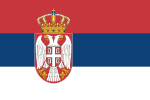| Revision as of 14:18, 28 November 2012 editXqbot (talk | contribs)Bots, Template editors2,325,690 editsm r2.7.3) (Robot: Modifying pl:Sajkaca to pl:Šajkača← Previous edit | Revision as of 03:05, 1 March 2013 edit undoAddbot (talk | contribs)Bots2,838,809 editsm Bot: Migrating 10 interwiki links, now provided by Wikidata on d:q390942 (Report Errors)Next edit → | ||
| Line 44: | Line 44: | ||
| ] | ] | ||
| ] | ] | ||
| ] | |||
| ] | |||
| ] | |||
| ] | |||
| ] | |||
| ] | |||
| ] | |||
| ] | |||
| ] | |||
| ] | |||
Revision as of 03:05, 1 March 2013
| This article does not cite any sources. Please help improve this article by adding citations to reliable sources. Unsourced material may be challenged and removed. Find sources: "Šajkača" – news · newspapers · books · scholar · JSTOR (December 2009) (Learn how and when to remove this message) |
 | |
| Use | |
|---|---|
| River flotilla headgear (18th century) National symbol (Modern) | |
| Origin | |
| 18th-century Serbia. |
The Šajkača (Serbian Cyrillic: шајкача, pronounced [ʃǎjkatʃa]) is the Serbian national hat or cap.
History
The Šajkača originated in the 18th century. It was originally worn by the Serbian river fleet as a military headgear (uniform) in the service of the Habsburg Empire (known as the šajkaši) around the Danube and Sava Rivers. These men conducted small-scale raids against the Ottomans, thus allowing Serb refugees from the Ottoman Empire to safely flee to the Habsburg Empire. The refugees copied the design of the hat and spread it widely within the Serbian community.

The distinctive hat is recognisable by its top part which looks like the letter V or like the bottom of a boat (viewed from above). It gained wide popularity in the early 20th century as it became an official part of the Serbian military uniform in 19th century. It was initially worn only by soldiers, the officers wore contemporary French-style Kepis but later wearing Peaked caps, but after 1903. it became part of the standard officer's uniform as well (the officers' ones were modified with a peak). It would continue to be used by the Royal Yugoslav Army.
During World War II, it was shortly worn by Serbian members of the Yugoslav Partisans until it was replaced by "Titovka" cap for soldiers and Peaked cap for officers' parade uniform. During the Bosnian war, the hat was worn by Bosnian Serb military commanders and many volunteer units in the 1990s.
Modern use

Today it is commonly seen in rural villages across Serbia, Bosnia and Herzegovina and Montenegro, often worn by elderly men.
See also
| Clothing | |||||||||
|---|---|---|---|---|---|---|---|---|---|
| Headwear | |||||||||
| Neckwear | |||||||||
| Underwear and lingerie |
| ||||||||
| Tops | |||||||||
| Bottoms |
| ||||||||
| Full-Body Wear |
| ||||||||
| Coats and outerwear |
| ||||||||
| Nightwear | |||||||||
| Swimwear | |||||||||
| Legwear | |||||||||
| Footwear | |||||||||
| Accessories |
| ||||||||
| Dress codes |
| ||||||||
| Related | |||||||||
